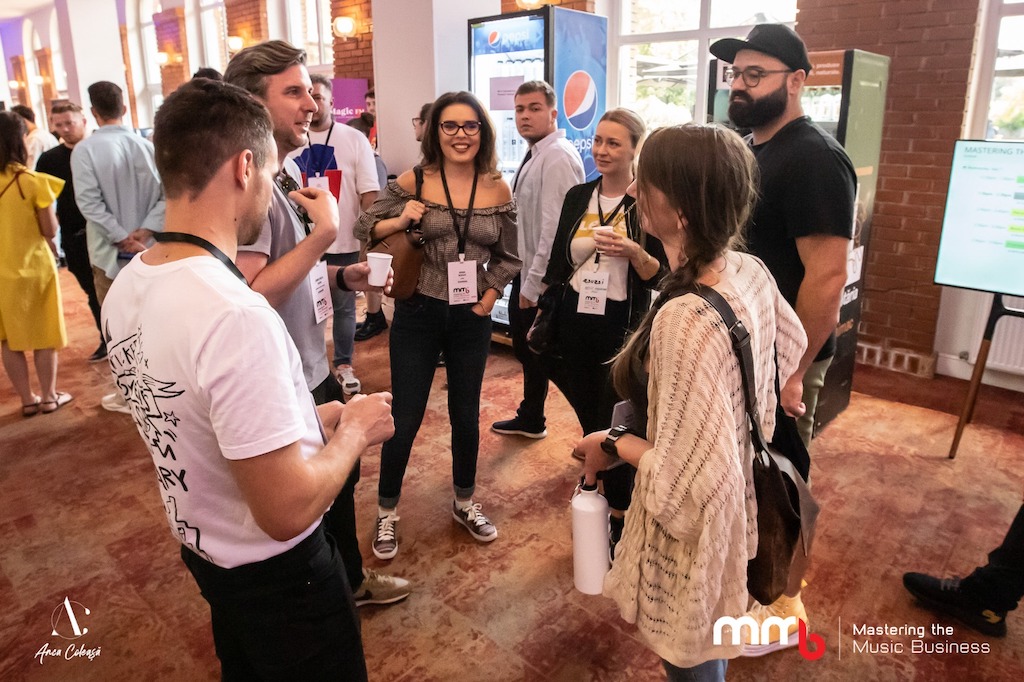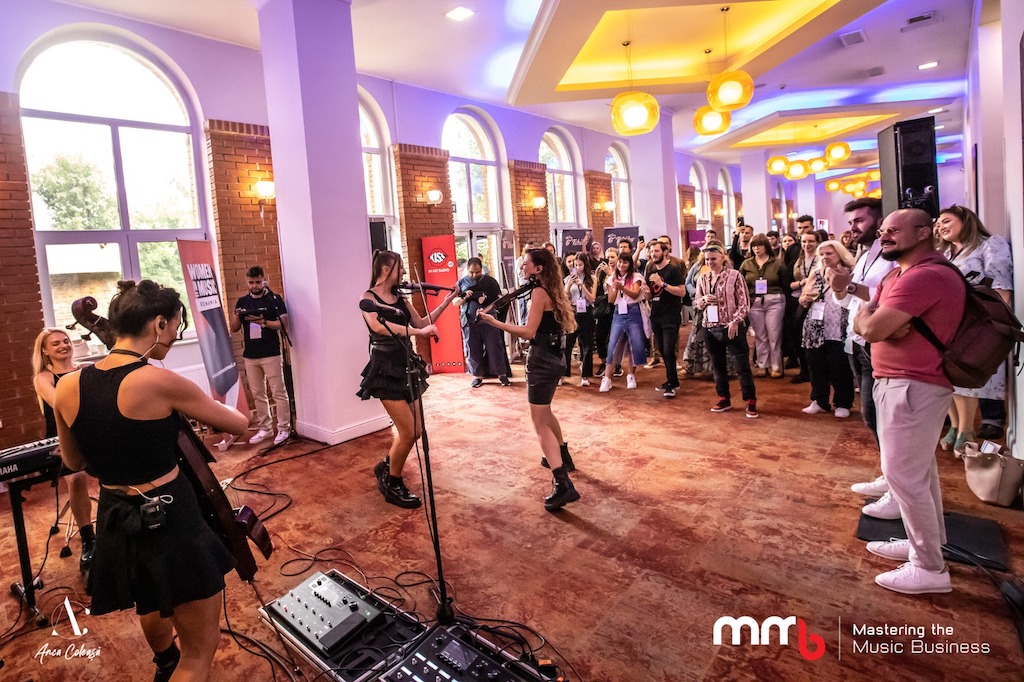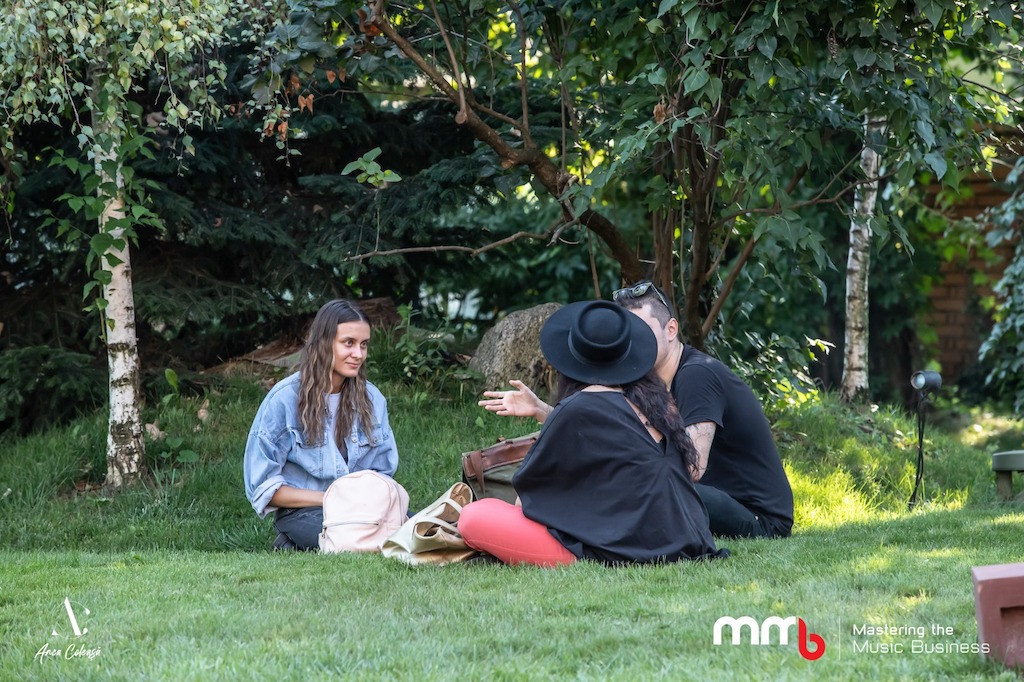:quality(80)/business-review.eu/wp-content/uploads/2023/08/Anca-Lupes.jpeg)
In the realm of the Romanian music business, few names resonate as profoundly as Anca Lupes. With a career that reads like a comprehensive guide to the industry, Lupes has amassed unparalleled experience across various facets, leaving an indelible mark on press, radio, TV, concert organizations, record companies, music publishing, and management and booking agencies. Business Review talked with her about Mastering the Music Business, the upcoming conference, which is the country’s inaugural music business conference, where Anca Lupes manifested her commitment to fostering knowledge exchange, industry networking, and professional growth.
Mastering the Music Business is the first and biggest international music business conference and showcase festival in Romania. Dedicated to all music enthusiasts, MMB is the place where both independent artists and key music business professionals are offered the opportunity to meet with leading experts in the local and international industry, learn from them, and interact with them directly.
The event takes place between September 5-7, 2023, in Bucharest, and more information is available here.
Can you share the inspiration behind starting the Mastering the Music Business conference? What drove you to create this event?
The need to catch up faster with the more developed industries. Also, the need to promote the local music industry and our artists. I truly believe there are many very talented Romanian artists that deserve to be seen more internationally.
What can attendees look forward to in the upcoming edition of the Mastering the Music Business conference? Are there any new features, themes, or formats you’re excited about?
We have more than 40 sessions during the conference – workshops, panels, interviews and presentations covering a large area of topics, from songwriting to copyrights, from international touring to mental health, from AI to music marketing and so on. Also, we are organizing 5 speed meeting sessions where MMB participants can apply to meet the professionals coming to the conference and pitch their projects. There are several networking events during the conference – breakfasts, lunches and happy hours where people can have a drink, grab a bite, and mingle.
There are a few special moments – the interview with Corina Chiriac which starts the „Legends” interviews series featuring legendary Romanian artists. Another premiere is the interview that Dan Fințescu will have with Edi Petrosel (Holograf) and his son, Jurjak – an insight of the father/son dynamics in a musical family, exploring the similarities and the differences between those two generations, among many others.

How do you go about selecting speakers and panelists for the conference? What criteria do you consider when inviting individuals to share their expertise with attendees?
We usually think about topics first, what would be interesting for the Romanian audience to find out, and then we look for relevant people to discuss these kinds of topics. Of course, it also happens the other way around when we see certain speakers at other conferences, and we invite them over if we think they could be relevant for our audience.
Looking ahead, how do you envision the future of the Mastering the Music Business conference? Are there any long-term goals or aspirations you’d like to achieve with the event?
Mastering The Music Business is now well established in Romania and one of the most appreciated conferences in this part of the world. We will continue to grow this event and we will promote Romanian talent and industry professionals abroad at the best of our abilities. Our goal is to have more international delegates from neighboring countries (and not only) willing to meet their Romanian peers. Moreover, we want to develop more our showcase festival and get more and more international booker to see them and (hopefully) to invite them in their events.
How has the Romanian music industry evolved since the conference’s inception, and what unique characteristics define the local music scene?
The local music industry is growing very fast, but I won’t say we played any role in that. It’s just that meeting with all the relevant people year after year and even in between, we can have a closer look at everything that’s happening around. And we are trying to mirror all success stories (or as many as we can) during the conference. And I realize now we’ve come a long way – from trying to present as many international success stories to the Romanian audience to bragging about our own success stories to the international participants coming to MMB.
The music festival landscape in Romania is still expanding. Are Romanians increasingly able to afford a growing number of music festivals?
By the look of it (and ticket sales), it seems they are. Festivals are good for artists, since there is still a lack of concert venues in our country. Also, they provide performing slots for up and coming artists, thus contributing to the refreshing of the live music scene.
Could you highlight some successful trends or emerging genres within the Romanian music industry that have gained prominence in recent years? How has the conference contributed to the recognition of these trends?
Trap has become really popular lately and the best example is the success of Beach Please Festival. We usually do not dedicate panels to certain music genres, but we discuss trends generally during the conference. Basically, the conference reflects what’s happening in the industry, we are not involved in developing music genres etc.

What are some challenges that artists and music professionals in Romania commonly face? How does the conference address these challenges and provide solutions to empower the local music ecosystem?
One of the biggest challenges for the artists is to find themselves a team of professionals to work with, there is no professional music press, there are very few concert venues, probably less than 50% now than before Colectiv, I have recently learned that – for example – there is not even one music venue/live music club in Timișoara, the roads infrastructure in Romania is a continuous challenge for touring artists and the list can go on for a long time.
We have been discussing these topics but unfortunately there is not much dialogue with the political side and very few representatives of public organizations working in the cultural field do respond to our invitations to become speakers at MMB.
Romania has produced notable talents that have gained international recognition. How does the conference support and showcase local talent on a global scale, helping them navigate the international music market?
We have always strived to support Romanian artists and music business professionals to connect with their international peers and the good news is that, starting with May 2023, RAW Music (which is the NGO organizing the conference) has been included in European Music Exports Exchange (EMEE), the association gathering all music export offices in Europe. This is a great achievement for us, as we are now much better connected with the entry points in all European markets and it will help us enhance our support for the export of local music and artists.
Also, since 2017 we have MMB Showcase Festival which presents local and international artists who want to expand their career internationally. The success stories of MMB Showcase Festival range from collaborations between Romanian and foreign artists, whose foundations were laid at the festival (Dan Byron and the Serbians from Ana and the Changes released a joint single), international bands that were booked to festivals in Romania (Ana and the Changes from Serbia and Piqued Jacks from Italy) and even artists and bands from Romania invited to festivals in Serbia (Exit), Netherlands (Eurosonic), Sweden (Live at Heart and Future Echoes), Hungary (BUSH), Slovenia (MENT) or Bulgaria (Spike).
The richest collection of success stories comes from the 2022 edition of the festival: the Romanian band Zimbru and the band IVA (from Bulgaria) – performed at Eurosonic (ESNS), the biggest showcase festival in Europe and Catalina Cara was invited to two showcase festivals: Future Echoes (Sweden) and Spike (Bulgaria).
At this edition, MMB Showcase Festival will take place again this year at Club Expirat every evening starting at 8:00pm.
What stands out as Romania’s most prominent music export? What factors contribute to its success on the international stage?
So far Romania excels in exporting pop-dance music – names like Inna, Alexandra Stan or Edward Maya are very well known abroad – but there are also other artists performing or being listened to around the world – from metal bands to classical artists. There is an expression that we use related to the potential of an artist to be successful in other territories: export ready. An export ready artist has a very good musical production, great performance on stage and has started to have fans abroad (that you can see on their social media and streaming platforms). Last but not least, they have a team that can take care of all things necessary to organize and implement an international strategy.
As part of the global music business landscape, what are some of the common misconceptions you’ve encountered about the Romanian music scene?
The main misconception people have before seeing our local artists is that they are not as talented as the international ones. One of our recurrent foreign guests has told me a few years ago: “I don’t know what’s happening but lately Romania has some very talented artists”. I told him “it’s not that these talented artists have emerged lately, it’s just that you haven’t had the opportunity to see them until now”. And this has motivated us even more to push our local artists in international festivals.

With the pandemic significantly affecting live events and the music industry, how would you describe the current state of the local industry in the post-pandemic era?
I feel the industry is recovering fast, especially the live industry. Still, the years of pandemic have been a huge set back for this field and it still suffers from lack of professionals who have fled the industry and/or the country looking for work when concerts were not allowed.
Looking ahead, how do you see the future of the Romanian music industry? What are your hopes and expectations for its growth and development, and how will the conference continue to play a role in that future?
I see a much better educated industry, more successful and with a bigger number of local artists becoming international. I do hope and dream about a music business school in Romania to also serve the adjacent territories, as professional education is as crucial as in all other industries, and highly contributes to the development of this sector. I really see this possible; judging on the increasing number of students coming to MMB, it seems they do start considering building careers in this domain.



:quality(80)/business-review.eu/wp-content/uploads/2024/07/VGP-Park-Timisoara_-8thbuilding_iulie-24.jpg)



:quality(80)/business-review.eu/wp-content/uploads/2024/06/22C0420_006.jpg)

:quality(80)/business-review.eu/wp-content/uploads/2024/06/COVER-1-4.jpg)



:quality(50)/business-review.eu/wp-content/uploads/2023/09/Cristina-Uruc.jpeg)
:quality(50)/business-review.eu/wp-content/uploads/2023/09/Screenshot-2023-09-06-at-1.19.37-PM.png)
:quality(50)/business-review.eu/wp-content/uploads/2023/09/MMB_Showcase_Event-Cover_datetime.jpeg)
:quality(80)/business-review.eu/wp-content/uploads/2024/06/br-june-2.jpg)
:quality(50)/business-review.eu/wp-content/uploads/2024/07/America-House-Offices-Bucharest-Fortim-Trusted-Advisors.jpg)
:quality(50)/business-review.eu/wp-content/uploads/2024/07/BeFunky-collage-33-scaled.jpg)
:quality(50)/business-review.eu/wp-content/uploads/2024/07/BeFunky-collage-32-scaled.jpg)